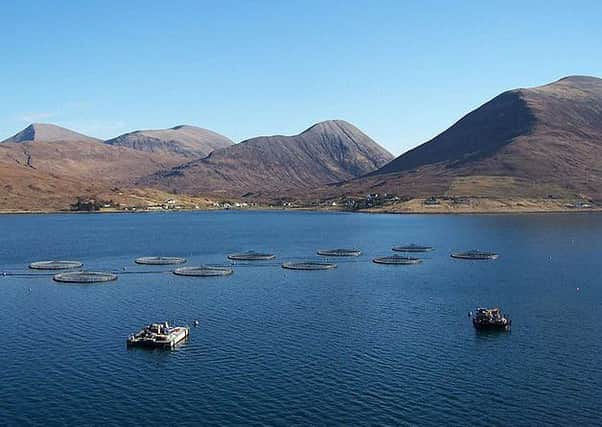1 in 5 fish farms must do better say Greens


The Green Party yesterday renewed its calls for a moratorium on the fish farming after it was found that one in five salmon farms failed to meet environmental standards.
Figures published by the Scottish Environment Protection Agency (Sepa) found that 56 of Scotland’s 297 fish farms were rated “poor”, “very poor” or “at risk”.
Advertisement
Hide AdAdvertisement
Hide AdThe total of fish farms which failed to meet the standards has risen slightly from 50 in 2016.
But the number represents a much greater percentage of the total number of licences issued, which fell from 352 to 297.
Reasons cited by Sepa for the ratings included excessive levels of ammonia being released into the sea and unregulated quantities of fish food and faeces discovered on the sea bed.
Scottish Greens environment spokesperson Mark Ruskell MSP said: “Public awareness of the damage being caused by salmon farms is growing and the news that many are failing to meet even the low standards we have now will add to that concern. This is yet another reason why we need a moratorium on this industry. Existing businesses need to clean up their act before any new farms are developed, otherwise we risk trashing Scotland’s reputation for good food and a clean environment.
“Sepa’s new regulations must deliver a sea change in the way the industry operates. Business as usual is unacceptable.”
Two parliamentary inquiries are currently looking at the impact of fish farming.
The Scottish Salmon Producers Organisation (SSPO) insists the issues have not led to any environmental deterioration.
Julie Hesketh-Laird, SSPO chief executive, said: “The Scottish salmon industry is committed to good environmental performance. In 2017 there was a slight drop in the industry’s compliance rate though we understand from SEPA that the issues have not led to any environmental deterioration.
Advertisement
Hide AdAdvertisement
Hide Ad“The industry works closely with Sepa to ensure it meets required standards, and addresses issues promptly where there is room for improvement. Indeed this is central to the way compliance is assessed, with farms required to demonstrate action to remedy non-compliance. The industry is committed to raising standards higher. Individual SSPO member companies will work quickly with Sepa to address issues where they arise.”
Scotland’s aquaculture sector saw overall compliance levels drop during 2017 to 81.14 per cent, against a relative peak of 85.75 per cent in 2016. Compliance levels in the whisky industry were higher and were praised by Sepa. Of the 172 licences assessed in 2017 for water abstraction, water discharges and effluent quality standards, 162 accomplished “excellent”, “good” and “broadly compliant” ratings, bringing the overall compliance to 94.19 per cent for the calendar year. Terry A’Hearn, Sepa chief executive, said: “Every day, Sepa works to protect and enhance Scotland’s environment helping communities and businesses thrive within the resources of our planet. We call this One Planet Prosperity. As part of that we’re clear, environmental compliance is non-negotiable. Every Scottish business will comply with the law, and we’ll work to ensure as many as possible will go even further.”